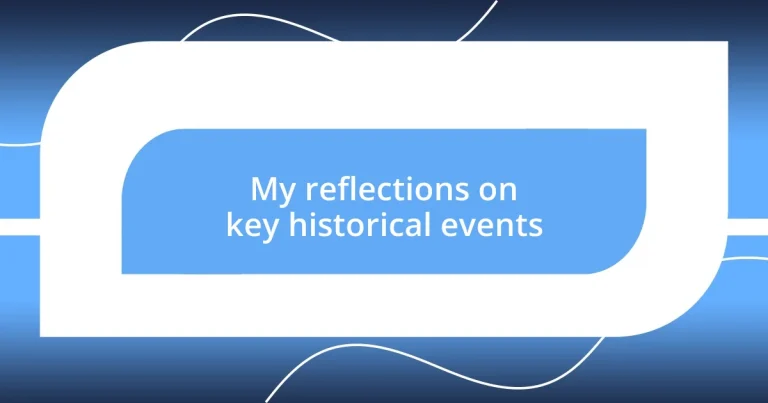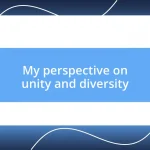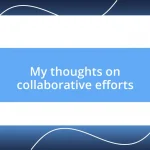Key takeaways:
- Historical events, such as the Civil Rights Movement and Women’s Suffrage, highlight the ongoing struggle for equality and inspire current activism.
- Understanding history fosters empathy, shapes identities, and provides context for contemporary challenges, reminding us of past sacrifices for our liberties.
- Lessons from history, including community resilience and the power of grassroots movements, motivate individuals to advocate for justice and inclusivity today.
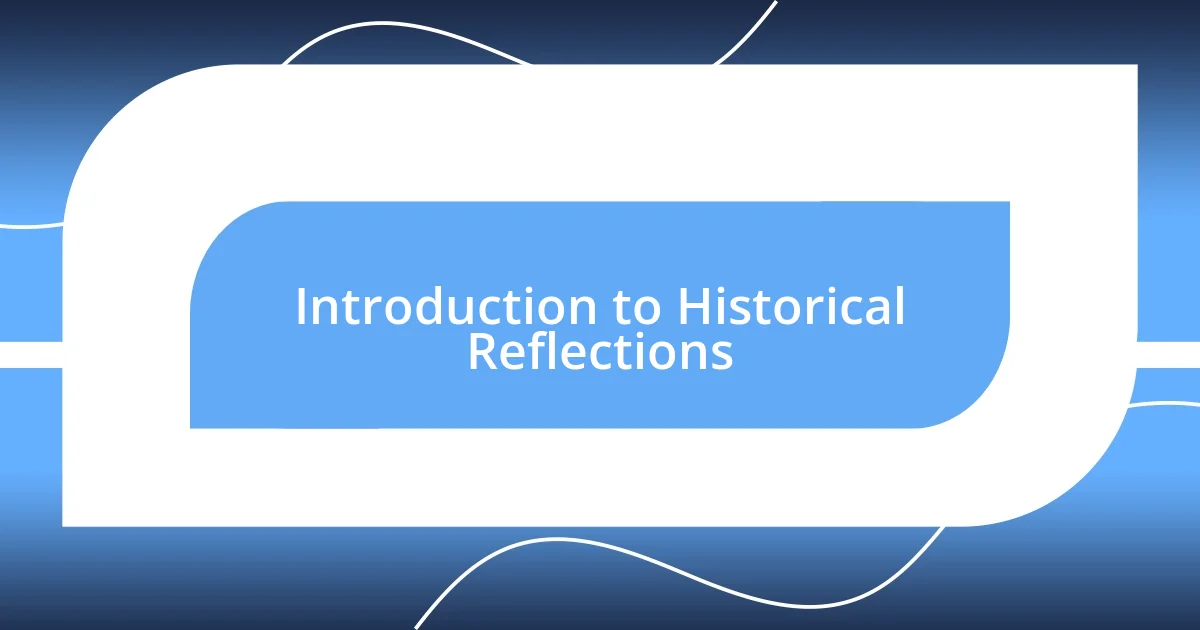
Introduction to Historical Reflections
Reflecting on historical events is more than just recounting dates and places; it’s about understanding the emotions and motivations that drove these moments. For instance, I remember the first time I learned about the civil rights movement—how it filled me with a sense of urgency and injustice. How can we truly appreciate progress without grappling with the struggles of the past?
When I think about significant historical moments, I often find myself pondering their relevancy today. It’s fascinating to realize how decisions made decades ago continue to shape our world. Have you ever wondered how our everyday lives might differ if those pivotal events had unfolded differently? It’s an engaging exercise that deepens our appreciation of history.
My reflections on historical events often lead me to a personal renaissance, prompting me to analyze my values and beliefs. There are days when I revisit the stories of resilience and bravery from the past and feel inspired to take action in my own community. Every historical reflection becomes a bridge, connecting our current reality with the lessons learned from those who came before us.
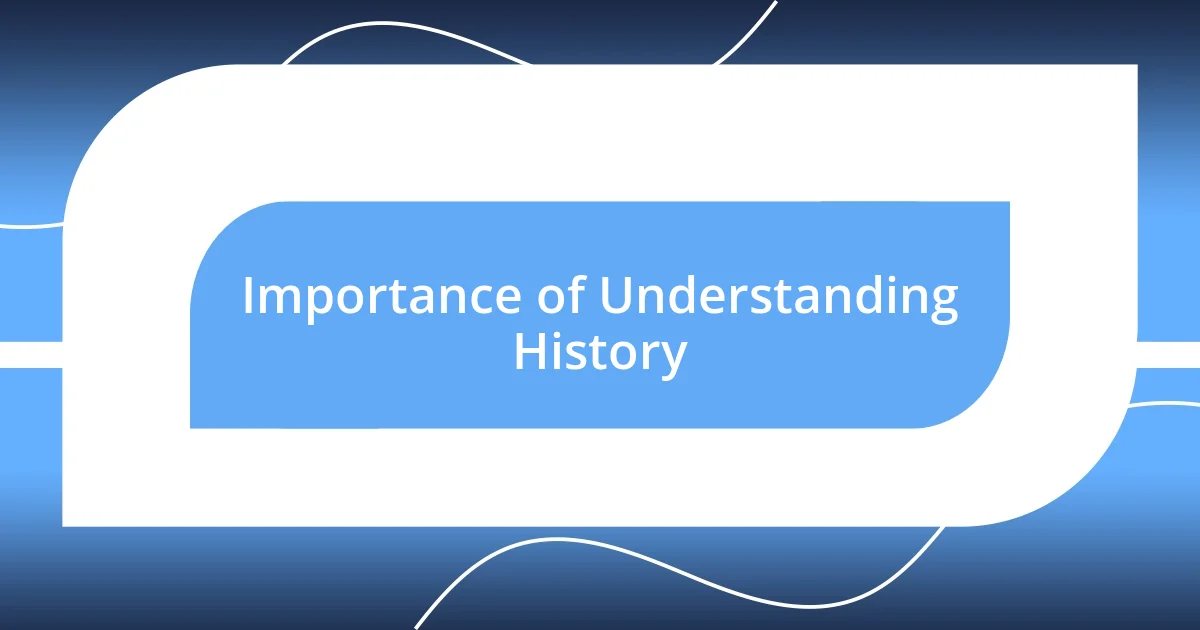
Importance of Understanding History
Understanding history isn’t just an academic exercise; it’s crucial for fostering empathy and critical thinking. When I delve into the struggles faced by previous generations, I often feel a surge of gratitude for the liberties I enjoy. This emotional connection reminds me that our present freedoms were won through immense sacrifices. History provides context to our lives, allowing us to understand the world through the perspectives of those who lived it.
- It helps us recognize the patterns in human behavior, enabling us to make informed choices today.
- Studying history encourages us to question our assumptions and biases, fostering a more nuanced worldview.
- Acknowledging past injustices can inspire us to advocate for equity in our communities.
- It connects us with our roots, shaping our identities and collective memories.
- Understanding history allows us to learn from mistakes, paving the way for a better future.
Reflecting on historical events has often evoked a sense of responsibility within me. For instance, when I read about the women suffragists fighting for the right to vote, I couldn’t help but feel a rush of determination. It compelled me to engage in local civic activities, understanding that action today can honor their legacy. History is not just a record of what was; it’s a call to participate in what can be.
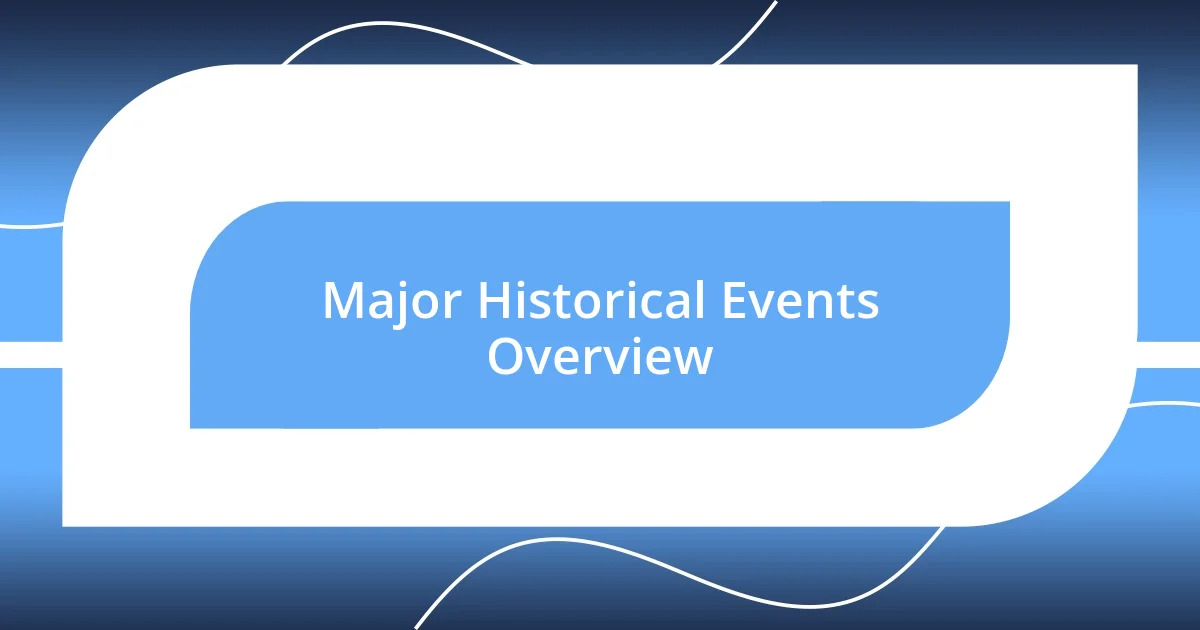
Major Historical Events Overview
Reflecting on significant historical events reveals the intricate tapestry of human experience. Each event, from wars to social movements, tells a story shaped by the passions, struggles, and triumphs of individuals. For example, I often think about the impact of World War II—not just in terms of the geopolitical changes it wrought but in the emotional scars and resilience it forged in people. The narratives of those who lived through that era offer profound lessons in courage and sacrifice.
As I delve deeper into pivotal moments like the fall of the Berlin Wall, I’m struck by how one event can symbolize freedom for millions. I remember discussing this with a friend who had family on both sides of that wall. Their stories highlighted the sheer joy and relief that came with uniting after years of separation. It’s these personal connections that enrich our understanding and drive me to reflect on how such events resonate in our lives today.
In exploring historical movements, I can’t help but feel a kinship with those who fought for change. The Stonewall Riots, for instance, not only marked a turning point for LGBTQ+ rights but also showed me the power of community resilience. Witnessing how far the movement has come inspires me to continue advocating for equality. I truly believe that these major historical events serve as a reminder of our shared humanity, encouraging us to push for progress in our own time.
| Event | Year |
|---|---|
| World War II | 1939-1945 |
| Fall of the Berlin Wall | 1989 |
| Stonewall Riots | 1969 |
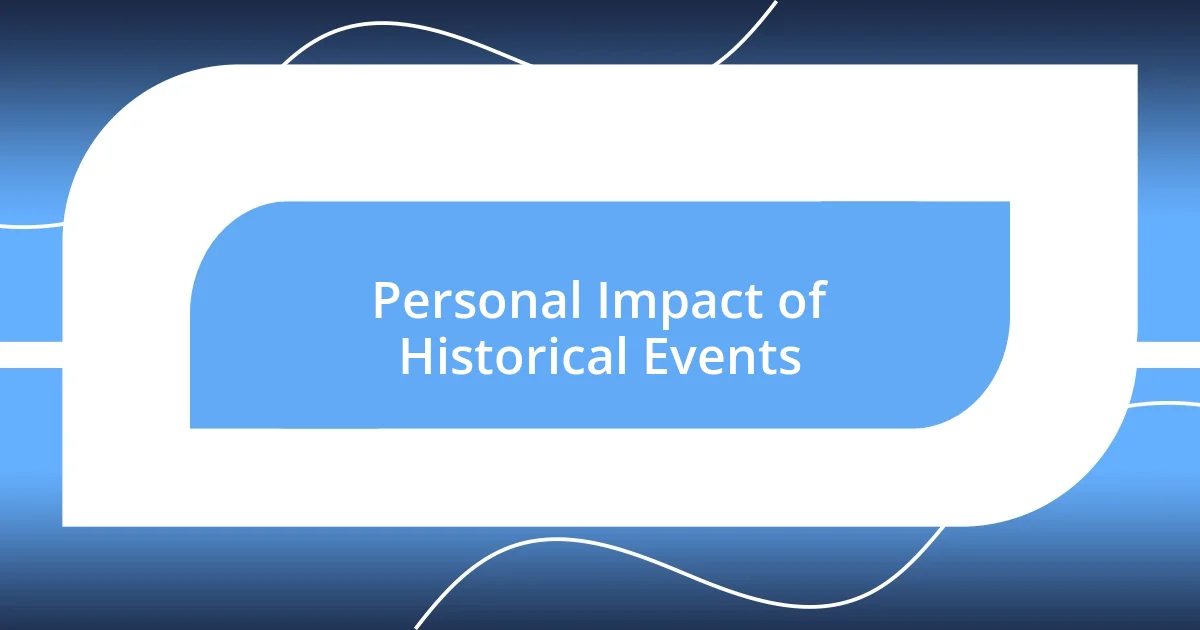
Personal Impact of Historical Events
Reflecting on the impact of historical events often leaves me contemplating my own life choices. When I think about the civil rights movement, I’m reminded of the powerful stories shared in family discussions around the dinner table. Hearing my grandmother talk about her experiences with segregation and her fight for equality made me realize the importance of standing up for what is right. It ignited a fierce passion in me to advocate for justice in my own community.
Every time I read about the devastating effects of the Great Depression, I can’t help but draw parallels to the economic challenges we face today. I remember my grandfather sharing his childhood memories of rationing and resilience during that tough era. His stories inspire me to appreciate the stability I have now, and they also urge me to support those who are struggling. How can we not reflect on our history and strive for positive change? It’s a gentle nudge to be aware of our surroundings and contribute meaningfully.
Additionally, my connection to significant historical events extends to more intimate moments, like when I visited a local memorial honoring veterans. Standing before those engraved names, I felt a rush of gratitude and sorrow, realizing the personal sacrifices behind each one. It makes me wonder, how do we carry their legacy forward? I believe it’s through actively participating in discussions about peace and advocating for policies that prevent conflict. These reflections remind me that history is not just a series of dates and facts; it’s woven into the fabric of our lives and shapes our collective narrative.
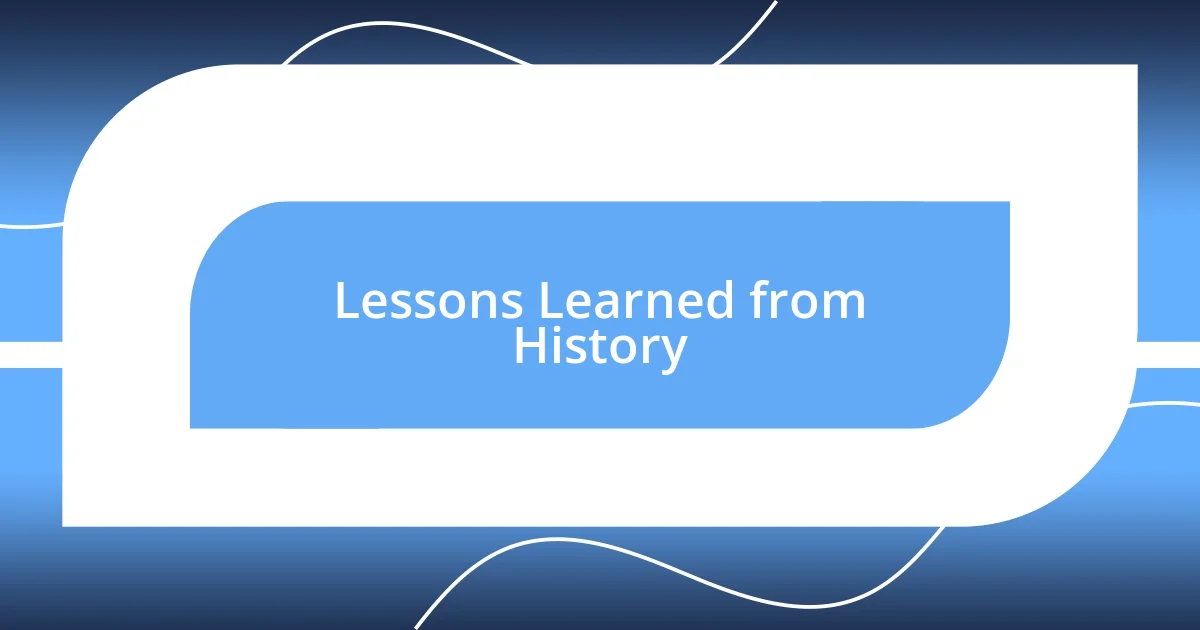
Lessons Learned from History
The past teaches us invaluable lessons about resilience. I think back to the time I toured a Holocaust memorial, standing in a space dedicated to remembering the lost lives. It was a deeply emotional experience that drove home the importance of standing against hatred and discrimination. Through the stories shared in that space, I learned how fragile peace can be, urging me to actively advocate for tolerance in today’s world.
Another lesson that resonates with me is the power of grassroots movements. I remember volunteering at a local campaign for environmental justice, inspired by the tireless activism of those before me. Their determination reminded me that change often starts small but can snowball into something significant. This hands-on experience reinforced my belief that we have the capacity to challenge the status quo—just as those who marched for civil rights did before us.
When I reflect on the tumultuous era of the Great Migration, I can’t help but think about my own family’s journey. My grandparents left their rural hometowns seeking better opportunities, carrying dreams born from hardship. Their struggles and triumphs inspire me to appreciate diversity and fight against systemic barriers today. How can we honor their legacy if not by pursuing justice and inclusivity? It’s a powerful reminder that each of us plays a part in shaping the future, guided by the lessons learned from those who came before us.
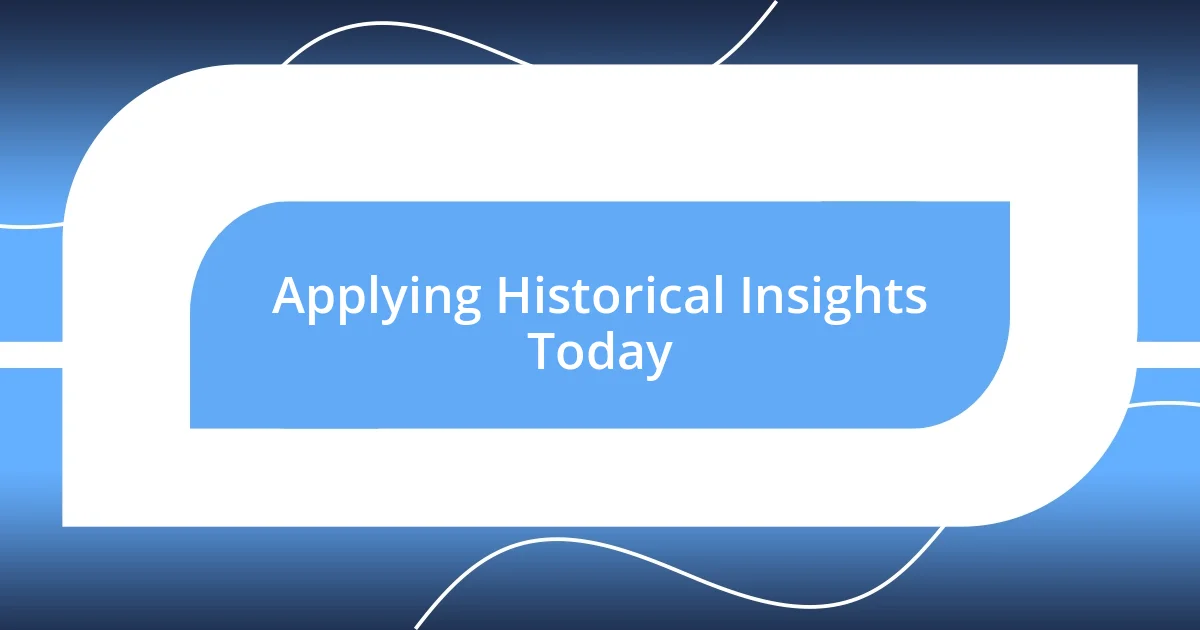
Applying Historical Insights Today
When I think about applying historical insights today, one incident stands out. Recently, I read about the Women’s Suffrage Movement, a relentless fight for basic rights that spanned decades. I felt inspired while volunteering for a local women’s organization, realizing that every voice matters in our pursuit of equality. The dedication of those who paved the way reminds me that we too must keep pushing for progress today. How can we move forward without acknowledging the sacrifices made for our rights?
Similarly, reflecting on the struggles faced during the Civil Rights Movement encourages me to speak out in my community. I participated in a local rally, feeling the vibrant energy of change in the air. The chants of the crowd echoed the calls for justice and unity from the past. It made me wonder, what would those activists think of our efforts now? I believe they’d urge us to press on, as history shows us that each generation has the power to reshape societal norms and challenge injustice.
It’s striking how often we encounter events in history that mirror our current reality. My experience attending a community forum on immigration policies brought this home for me. As stories unfolded, reminiscent of the struggles faced by immigrants in previous decades, I couldn’t help but reflect on my own family’s immigrant background. How do we ensure that history doesn’t repeat itself? By engaging in informed discussions and advocating for compassion, we honor those who fought for a better future, keeping their legacy alive in our actions today.
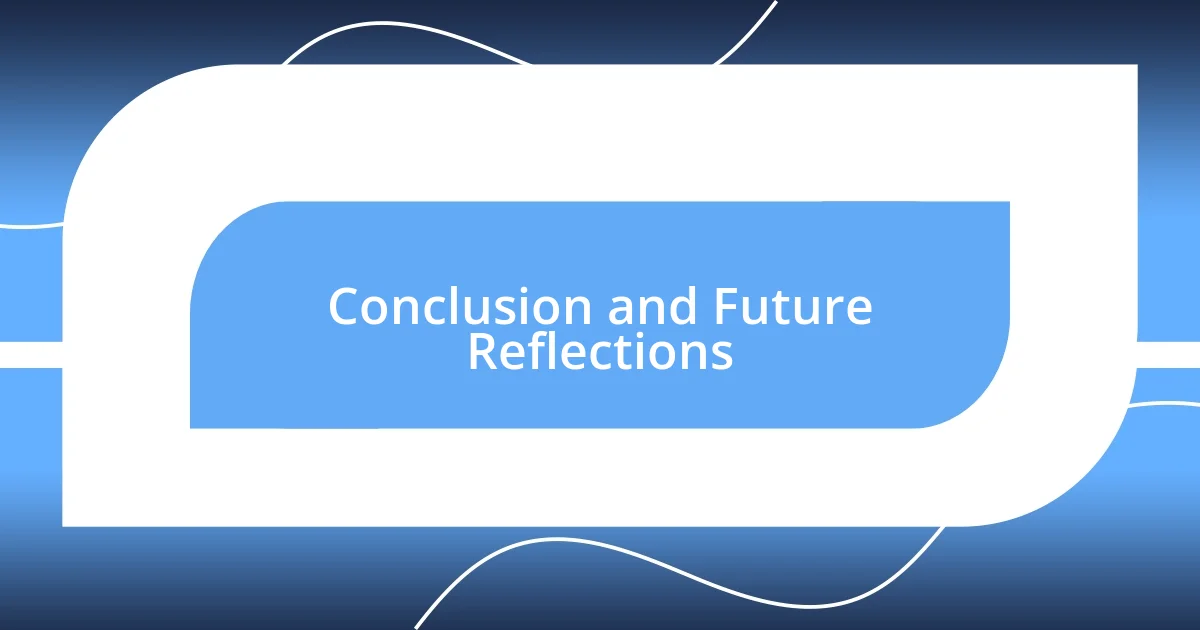
Conclusion and Future Reflections
Reflecting on these historical events and their lessons often leaves me wondering about the future. I think back to my experience volunteering with at-risk youth, where I saw firsthand the challenges they face in navigating a society that still grapples with inequality. It became clear to me that our actions today will shape the contours of tomorrow. How can we ensure that these youthful voices are empowered? I believe it’s imperative to create spaces where they can share their stories and drive change, echoing the movements of the past.
As I consider the impact of history on our collective future, I’m reminded of the pivotal moments in my life that echoed broader social movements. There was the time I attended a workshop on restorative justice, where participants engaged in dialogues about forgiveness and healing. Listening to stories of transformation inspired me to think critically about how we address conflict in our communities. What if we could create a culture of understanding instead of division? I think it’s possible if we learn from the past and actively work towards bridging gaps rather than deepening divides.
Looking ahead, it’s become essential for me to advocate for environments that encourage learning from history. One time, I hosted a small gathering to discuss critical historical events and their relevance today. The conversations were vibrant and packed with emotion, revealing how deeply connected we feel to these stories. What legacy do we want to create as stewards of history? Ultimately, I believe it lies in nurturing empathy and promoting dialogue, ensuring that the lessons learned shape a future that reflects inclusivity and justice for all.












